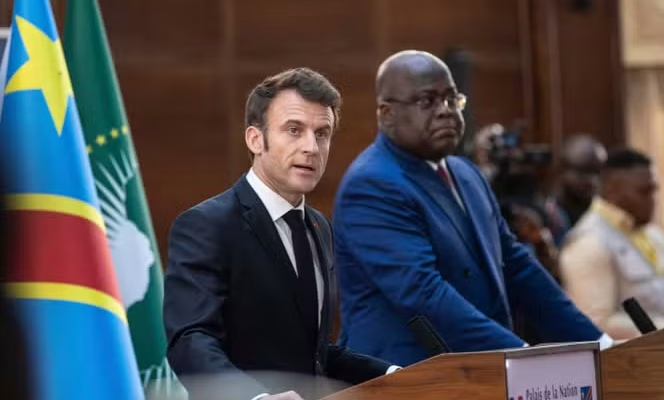France Involvement In The DRC & Influence In Rwanda
During the colonial era, while Belgium controlled the Democratic Republic of the Congo (DRC), France maintained dominance over neighboring territories such as the Republic of Congo (Brazzaville), the Central African Republic, Chad, and Gabon. This extensive regional influence allowed France to exert significant pressure on the DRC.
French intelligence played a key role in undermining the newly independent DRC’s first prime minister, Patrice Lumumba. By distributing anti-Lumumba propaganda and inciting military mutinies, France contributed to the instability that led to his downfall. Following Lumumba’s assassination in 1961—engineered by the CIA and Belgium—France aligned itself with Mobutu Sese Seko, the dictator who would rule for over three decades.
Under Charles de Gaulle and later François Mitterrand, France provided Mobutu with military, financial, and diplomatic support, despite his regime’s notorious corruption and human rights abuses. In return, Mobutu safeguarded Western mining interests and allowed French businesses to operate freely in Zaire (as the DRC was then called). One of the key beneficiaries was Elf Aquitaine (now part of Total Energies), which secured lucrative oil and mineral contracts, ensuring French economic priorities took precedence over Congolese development.
France also played a direct military role in propping up Mobutu. During the First Shaba Invasion (1977), it airlifted Moroccan and Serbian troops to Zaire to suppress an attempted rebellion. The following year, during the Second Shaba Invasion (1978), France deployed Foreign Legion paratroopers to secure Mobutu’s hold on power. His dictatorship served Western interests by granting France and its allies access to Congolese airspace and territory for military operations.
France’s involvement in the 1994 Rwandan Genocide further destabilised the region. Paris was a staunch supporter of the Hutu-led Rwandan government, which orchestrated the genocide against the Tutsi minority. French military advisers trained, armed, and funded Hutu extremists, including the Interahamwe militia responsible for mass killings.
As Rwanda and Uganda supported Laurent-Désiré Kabila’s rebellion against Mobutu, France worked covertly to maintain its influence in the region. When Mobutu’s rule collapsed in the mid-1990s, France shifted its approach, backing regional actors to retain control over Congolese resources. However, after Kabila took power, France saw his alliances with Rwanda, Uganda, and Angola as a threat to its influence and actively opposed his government.
In 2010, then-French President Nicolas Sarkozy admitted that France had made “serious errors of judgment” regarding Rwanda, though he stopped short of apologising for its role in the wider Congo conflict. Meanwhile, Rwandan forces, led by Paul Kagame, have exploited billions of dollars’ worth of gold, tin, tungsten, and tantalum—key minerals for modern electronics—fueling ongoing conflict in eastern DRC.
During the Rwandan genocide, France launched Operation Turquoise, claiming it was a humanitarian mission. In reality, the operation enabled Hutu extremists to flee into eastern Congo, where they formed armed groups that continued to destabilise the region. One such group, the Democratic Forces for the Liberation of Rwanda (FDLR), was led by figures like Callixte Mbarushimana, who lived in Paris as a political refugee for eight years before France finally arrested him in 2010 under international pressure.
France continues to wield influence in Central Africa through the CFA franc, a currency system that keeps former colonies economically tied to Paris. While the DRC does not use the CFA franc, it is surrounded by francophone nations such as the Central African Republic, Chad, Congo-Brazzaville, and Gabon, all of which shape its trade and economic landscape.
Today, instability persists in North and South Kivu, where the Rwanda-backed M23 rebels and other militias commit mass killings, sexual violence, and exploit resources. Although France publicly condemns Rwanda’s support for M23, it maintains strong military and economic ties with Kigali.
Since 2021, Rwanda has deployed troops to Mozambique’s Cabo Delgado region, ostensibly to combat insurgents. However, these troops also protect French multinational Total Energies’ LNG operations, strengthening Rwanda’s military while contradicting France’s official stance on M23. Despite recent M23 offensives, France has refused to support the DRC’s calls for sanctions against Rwanda, highlighting its ongoing geopolitical balancing act in the region.
What's your reaction?
Excited
0
Happy
0
In Love
0
Not Sure
0
Silly
0

















